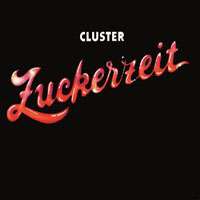Zuckerzeit
Zuckerzeit (German: Sugar Time) is the third full-length album by German band Cluster, released in 1974 on Brain Records. It was co-produced by Michael Rother, their bandmate in side-project Harmonia. The music on Zuckerzeit marks a shift from Cluster's abrasive early work toward a more rhythmic, pop-oriented sound.[5] Pitchfork ranked the album number 63 on their "Top 100 Albums of The 1970s,"[6] while writer and musician Julian Cope included Zuckerzeit in his "Krautrock Top 50."[7]
| Zuckerzeit | ||||
|---|---|---|---|---|
 | ||||
| Studio album by | ||||
| Released | 1974 | |||
| Recorded | January 1974 | |||
| Genre | ||||
| Length | 36:13 | |||
| Label | Brain | |||
| Producer | Cluster & Michael Rother | |||
| Cluster chronology | ||||
| ||||
Background
Zuckerzeit was recorded following Cluster's move from West Berlin to the countryside of Forst, and came after their collaboration with Neu! guitarist Michael Rother on the 1973 Harmonia album Musik von Harmonia.[8] The album's short instrumental tracks marked the group's shift toward a pop-oriented style which utilized cheap drum machines and synthesizers.[9] Each track is a solo composition, with the two members recording separately on different days;[4] The Quietus noted that "it is in reality two solo EPs masquerading as a joint release."[8]
Rother is credited as co-producer, but his primary role was to leave the group some of his equipment, including Farfisa instruments, a four-track recorder, a stereo mixer, and an Elka Drummer One drum machine.[4] With the latter, the group experimented with mixing up multiple preset rhythms at once,[4] as well as running the drum machine through echo, vibrato, and wah pedals, and cutting parts of the rhythm entirely.[10]
Reception
| Review scores | |
|---|---|
| Source | Rating |
| Allmusic | |
| Pitchfork Media | (9.0/10)[12] |
John Bush of Allmusic described Zuckerzeit as "an unexpected jump from the extended kosmische jams of Cluster 71 into uncharted territory [...] fusing the duo's haunted melodic sense with crisp, scratchy drum programs."[13] Pitchfork described it as "electronic pop at its most protean," and compared it to "a sugar overload: giddy, infectious, manic and a little queasy."[14] Vinyl Me, Please stated that "even with drum machines and synths, Cluster pushed past the rigidity that defined their more successful peers in Kraftwerk, making spacier, improvisational electronic music."[15]
Legacy
In a review of Cluster's 1971-1981 box set, AllMusic's Paul Simpson called the album a "masterpiece [that] combined trippy drum machine rhythms with woozy, pastoral melodies, resulting in a skewed, playful vision of futuristic pop. The recording remains a watershed moment in electronic music, and is easily one of the best albums of the '70s."[16] Writer Ulrich Adelt stated that the album's "influence on electronic music was significant, and many more contemporary groups have copied [its] lo-fi sound."[9]
Among its fans are Brian Eno and Pitchfork Media, the latter of which ranked the album number 63 on their "Top 100 Albums of The 1970s".[17] Julian Cope included Zuckerzeit in his Krautrock Top 50.[18]
Track listing
| No. | Title | Writer(s) | Length |
|---|---|---|---|
| 1. | "Hollywood" | Roedelius | 4:48 |
| 2. | "Caramel" | Moebius | 2:58 |
| 3. | "Rote Riki" | Moebius | 6:18 |
| 4. | "Rosa" | Roedelius | 4:13 |
| No. | Title | Writer(s) | Length |
|---|---|---|---|
| 5. | "Caramba" | Moebius | 3:57 |
| 6. | "Fotschi Tong" | Roedelius | 4:21 |
| 7. | "James" | Moebius | 3:21 |
| 8. | "Marzipan" | Roedelius | 3:14 |
| 9. | "Rotor" | Moebius | 2:40 |
| 10. | "Heiße Lippen" | Roedelius | 2:23 |
Personnel
- Hans-Joachim Roedelius
- Dieter Moebius
- Michael Rother – producer
Notes
- Beta, Andy (2016). "Pitchfork: Cluster: 1971-1981". pitchfork.com. Retrieved 17 June 2016.
Zuckerzeit
- Cauvel, Peter. "The 10 Best Krautrock Albums To Own On Vinyl". Vinyl Me, Please. Retrieved 25 April 2019.
- Seabrook, Thomas Jerome (2008). Bowie in Berlin: A New Career in a New Town. Jawbone Press. p. 85. Retrieved 25 April 2019.
- Stubbs, Dusty (2015). Future Days: Krautrock and the Birth of a Revolutionary New Music. Melville. Retrieved 3 May 2019.
- Beta, Andy (2016). "Pitchfork: Cluster: 1971-1981". pitchfork.com. Retrieved 17 June 2016.
Zuckerzeit
- Pitchfork Media [ Top 100 Albums of the 1970s Archived February 19, 2007, at the Wayback Machine
- Cope, Julian A Krautrock Top 50 Archived September 29, 2007, at the Wayback Machine
- Doran, John. "The Vinyl Staircase: June In Record Buying Misery". The Quietus. Retrieved 1 May 2019.
- Adelt, Ulrich (2016). Krautrock: German Music in the Seventies. University of Michigan. p. 180. Retrieved 7 May 2019.
- Dayal, Geeta. "Interview - Dieter Moebius". frieze. Retrieved 6 May 2019.
- Bush, John (2011). "Zuckerzeit - Cluster - AllMusic". allmusic.com. Retrieved 26 June 2011.
- Beta, Andy (2016). "Pitchfork: Cluster: 1971-1981". pitchfork.com. Retrieved 17 June 2016.
Zuckerzeit
- Bush, John (2011). "Zuckerzeit - Cluster - AllMusic". allmusic.com. Retrieved 26 June 2011.
- Beta, Andy (2016). "Pitchfork: Cluster: 1971-1981". pitchfork.com. Retrieved 17 June 2016.
Zuckerzeit
- Cauvel, Peter. "The 10 Best Krautrock Albums To Own On Vinyl". Vinyl Me, Please. Retrieved 25 April 2019.
- Simpson, Paul. "Review: 1971-1981 - Cluster". AllMusic. Retrieved 7 May 2019.
- Pitchfork Media [ Top 100 Albums of the 1970s Archived February 19, 2007, at the Wayback Machine
- Cope, Julian A Krautrock Top 50 Archived September 29, 2007, at the Wayback Machine
External links
- Bush, John Allmusic review. Retrieved August 18, 2007.
- Curry, Russ A Curious History of Cluster. Retrieved August 18, 2007.